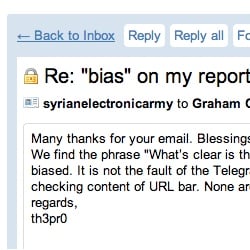Oh dear.
The Telegraph, a stalwart of the British establishment, is the latest in a long line of prestigious media publications (and The Onion) to find itself hacked by the Syrian Electronic Army.
Followers of the newspaper on Twitter and Facebook this evening were presented with out-of-character messages.
Here’s what it said on The Telegraph’s Facebook page:

And a number of messages were posted on the newspaper’s @TelegraphNews Twitter account:

The Syrian Electronic Army also boasted on Twitter that in addition it had compromised other accounts belonging to the newspaper: @TeleTheatre, @TelegraphOpera, @TelegraphArt, @TelegraphFilm, @Tele_Comedy, @TelegraphSport, and @TelegraphBooks.
The offending messages appear to have now been removed, suggesting that someone at The Telegraph (or their friends at the social networks) has managed to wrestle control away from the hackers.
What’s clear is that someone at The Telegraph was a little careless about their computer security and – most likely – managed to get phished by the Syrian Electronic Army. The hackers were then able to use stolen passwords to access the newspaper’s social media accounts.
In recent weeks, the Syrian Electronic Army have broken into online accounts belonging to the likes of The Guardian, Associated Press, CBS, FIFA and the BBC, resulting in Twitter issuing a warning to all media organisations to take greater care over their security.
One suspects that it’s not just media organisations who are failing to find the funny side of the Syrian Electronic Army’s hacks, but Twitter also. After all, every time a high profile account gets hacked questions are asked as to whether the micro-blogging site is doing enough to secure the accounts of important world-famous brands.
One has to wonder if the micro-blogging network is conducting its own investigation into the Syrian Electronic Army, and collecting data on how and when its Twitter accounts are accessed, in the hope that they might help build a case against those responsible.
Update: The Syrian Electronic Army got in touch with me after this article. Read what they had to say.


